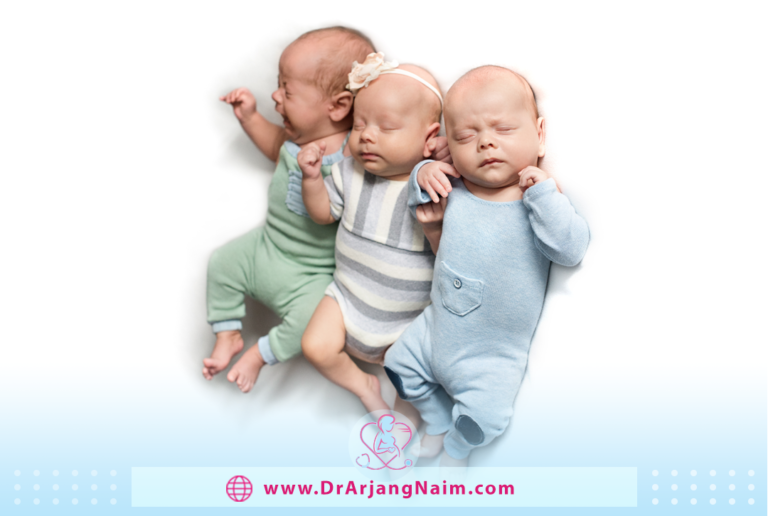Multiple pregnancies are a unique and exciting experience, but they also come with increased risks and challenges. While the joy of welcoming multiple babies into the world is immeasurable, expectant parents need to be prepared for the, emotional, physical, and financial demands that come with this type of pregnancy. By seeking early prenatal care, eating a healthy diet, getting enough rest, and joining a support group, parents can better navigate the journey of multiple pregnancies and ensure their and their babies’ well-being.
What causes multiple pregnancies?
A multiple pregnancy means that you are carrying more than one baby. Multiple pregnancies usually occur when more than one egg is fertilized. It can also happen when an egg is fertilized, splits into two or more embryos, and becomes two or more babies.
The babies are called identical twins when a fertilized egg splits in two. They are almost identical and have the same genes. When two separate eggs are fertilized by two separate sperm, the babies are called fraternal twins. They do not have the same genes and are no more alike than siblings from different pregnancies with the same parents.
However, more people are getting pregnant with multiples now than ever before. This is mainly because more people have children of older ages, and multiples are more common among parents over 30. Also, more people are using fertility treatments to get pregnant.
How do you know if you’re pregnant with multiples?
Early signs of multiple pregnancies can sometimes be more noticeable than those of a single pregnancy. However, it’s important to remember that these are just indicators, and a positive pregnancy test is the only definitive way to confirm a multiple pregnancy.
Here are some potential signs:
- Intense morning sickness: This can be more severe and persistent in multiple pregnancies.
- Rapid weight gain: You may gain weight faster than expected early in your pregnancy.
- Larger uterus: Your uterus may feel larger than it should be for your gestational age.
- Stronger fetal movements: You may feel more intense or frequent fetal movements.
- Ultrasound: An early ultrasound can confirm a multiple pregnancy.
If you are experiencing any of these symptoms, it is a good idea to schedule a prenatal appointment with your healthcare provider for a more accurate assessment.
What kind of prenatal care is needed in multiple pregnancies?
Prenatal care is crucial for all pregnancies, but it’s especially important for those carrying multiples.
Preconception care for multiple
Prenatal care is important for all pregnancies, but it is especially important for multiple carriers. Due to the increased risks associated with multiple pregnancies, such as premature delivery and low birth weight, frequent and more specialized care is necessary.
More frequent examinations
- Early pregnancy: Compared to singleton pregnancies, more frequent appointments are likely to be needed in early pregnancy, especially in the second and third trimesters.
- Late in pregnancy: As the due date approaches, appointments may increase to monitor your baby’s growth and development.
Specialized ultrasound examinations
- Initial ultrasounds: To confirm the number of embryos and identify possible complications.
- Regular ultrasounds: To track the growth and development of each fetus, assess the level of the placenta and amniotic fluid, and check for any signs of preterm labor.
Fetal heart rate monitoring
- Further monitoring is needed to ensure the heart health of each fetus.
- Non-stress tests to assess the child’s response to stress.
Genetic testing
Multiple pregnancies are associated with a higher risk of certain genetic diseases. A healthcare provider may recommend genetic testing.

Blood tests
Blood tests are mostly done to monitor the health of the mother and baby.
Education and advice
Your healthcare provider will inform you about the risks and benefits of multiple pregnancies. You will likely receive advice about preterm labor and delivery, including what symptoms to look out for and what to do if you experience them.
Are identical twins or triplets always the same sex?
Because identical twins or triplets share the same genetic material, they are always the same sex. The baby’s sex is determined by a special sperm cell that fertilizes the egg during fertilization. There are two types of sperm cells – those that carry the X or Y chromosome. The mother’s egg carries an X chromosome. If a sperm cell carrying an X chromosome fertilizes the egg, it creates an XX compound (female). If the sperm cell carries a Y chromosome, you will have an XY (male) pair.
Identical multiples start as one egg and then divide, so whatever chromosome combination is present at fertilization is the sex of all multiples.

What increases the chances of multiple pregnancies?
Several factors can increase the risk of giving birth to multiple. If:
- Are older (women in their 30s are at higher risk for multiples, as the body begins to release multiple eggs simultaneously).
- Are you a twin, or do you have twins in your family?
- Use fertility drugs.
- Also, if you are taller than average or overweight, you may be at risk of having multiples.
Another risk factor for multiple pregnancies is genetics. If you have multiples yourself or if multiples run in your family, the chances of having multiples increase. This hereditary trait is generally passed down from the mother’s side of the family.
Using fertility drugs can be another reason you may have multiple. Infertility treatments can increase the risk of multiple pregnancies because procedures such as in vitro fertilization often involve transferring more than one fertilized egg into your uterus. Your provider will usually transfer more than one egg at a time to increase the chances of a successful pregnancy.
Complications
Most healthcare providers treat multiple pregnancies more than single pregnancies. This does not mean that every woman who gives birth to more than one baby during pregnancy will have problems.
If you are pregnant with multiples, your doctor will want to monitor you for possible complications that can occur when carrying more than one baby at a time.
Premature delivery
The most common complication of multiple births is premature delivery. If you are pregnant with multiples, you are more likely to give birth prematurely (before 37 weeks) than a woman carrying only one baby. The goal of many mothers of multiples is to complete 37 weeks. This week is considered a term in twin pregnancy, and reaching this week increases the probability of a healthy birth with the appropriate weight of babies.

Preeclampsia, or high blood pressure in pregnancy
During pregnancy, your healthcare provider will monitor your blood pressure closely to make sure you don’t develop gestational hypertension. This can lead to a dangerous condition called preeclampsia. Complications related to high blood pressure occur twice as often in women with multiples than in women with singletons. This complication also tends to occur earlier in pregnancy and be more severe in multiple pregnancies than in singleton pregnancies.
Gestational diabetes
You can develop diabetes during pregnancy. This happens due to an increase in hormones from the placenta. The size of the placenta can also be the cause of this disease. If you have two pairs, insulin resistance increases.
Placenta previa
This complication occurs when the placenta separates from the uterine wall before delivery. This is an emergency situation. Placenta previa is more common in women with multiples.
Fetal growth restriction
Fetal growth restriction may also be called intrauterine growth restriction (IUGR) or small for gestational age (SGA). This condition occurs when one or more of your babies are not growing at the correct rate. This condition may cause babies to be born prematurely or with low birth weight. Almost half of multiple pregnancies face this problem.
Twin polycythemia anemia syndrome (TAPS)
This condition occurs when one twin bleeds to the other due to vascular connections at the level of the placenta. In this condition, one twin has anemia (low red blood cells), while the other has polycythemia (too many red blood cells). Several treatments/interventions are done when this happens.
Reverse arterial blood flow syndrome of twins
In this condition, one twin’s heart pumps blood for the circulation of both twins. A twin without a heart will not survive after birth, and the outcome of a twin with an average heart is different. Fortunately, this syndrome is rare and can be treated with intrauterine procedures.

Exercise during multiple pregnancy
Exercise is generally recommended for most pregnant women, including those carrying multiples. It can offer numerous benefits, such as improving your mood, reducing discomfort, and preparing your body for labor and delivery.
Benefits of exercise during multiple pregnancy
- Improved fitness: Regular exercise can help you maintain a healthy weight and overall fitness.
- Reduced discomfort: Exercise can alleviate common pregnancy discomforts like back pain, swelling, and fatigue.
- Increased energy: Staying active can boost your energy levels and help you feel better.
- Improved mood: Exercise can help reduce stress and anxiety, benefiting you and your babies.
- Preparedness for labor: Regular exercise can help strengthen your muscles and improve your endurance, which can be helpful during labor and delivery.
Safe exercise guidelines for multiple pregnancy
- Consult your doctor: Always consult your healthcare provider before starting or modifying any exercise routine during pregnancy, especially if you have any health conditions or complications.
- Low-impact activities: Opt for low-impact exercises like swimming, walking, prenatal yoga, and gentle stretching.
- Listen to your body: Pay attention to your body and avoid overexertion. If you experience pain or discomfort, stop and rest.
- Stay hydrated: Drink plenty of fluids, especially during exercise.
- Avoid overheating: Exercise in a cool environment and take breaks as needed to avoid overheating.
Exercise ideas for multiple pregnancy
- Swimming is a great, low-impact exercise that can help relieve joint stress.
- Walking: It is a simple and effective way to stay active.
- Prenatal yoga: Prenatal yoga can help improve your flexibility, strength, and balance.
- Low-impact aerobics: Look for prenatal aerobics classes that focus on low-impact movements.
- Stretching: It can help alleviate muscle tension and improve your flexibility.
Remember, consistency is key. Aim for at least 30 minutes of moderate-intensity exercise most days of the week.
The bottom line
Multiple pregnancies are a unique and rewarding experience but also come with increased risks and challenges. While the joy of welcoming multiple babies into the world is immeasurable, expectant parents must be prepared for the emotional, physical, and financial demands of this type of pregnancy.
Additional questions
- If you are pregnant with multiples, should you use special food?
No, but you need more specific nutrients like folic acid, protein, iron, and calcium. You can get these nutrients right by eating healthy foods and taking prenatal vitamins daily.
- How much weight should you gain if you are pregnant with multiples?
Weight gain in multiple pregnancies is generally higher than in singleton pregnancies. This is because you carry more than one baby, extra placenta, and amniotic fluid. General instructions include:
- Twins: Aim to gain between 35 and 50 pounds.
- Triplets: Aim to gain between 45 and 65 pounds.
- What age is a risk of multiples?
The risk of multiple births increases with age. This is especially true for women over 30. Here’s how age affects this risk:
- Under 30 years: The risk of multiple pregnancies is relatively low.
- 30-35: The risk starts to increase.
- 35-40: Risk continues to increase significantly.
- Over 40 years old: The risk is the highest.
- Which country has more twins?
Benin’s small West African country has more twins than any other developing country.
- How can a single parent effectively raise twins?
- Ask for help
- Develop routines
- Feed them simultaneously
- Link up with other parents raising twins single-handedly
- Avoid comparing them
References
https://my.clevelandclinic.org/health/articles/9710-expecting-twins-or-triplets
https://www.stanfordchildrens.org/en/topic/default?id=overview-of-multiple-pregnancy-85-P08019
https://www.tommys.org/pregnancy-information/im-pregnant/multiple-pregnancy
https://info.health.nz/pregnancy-children/during-pregnancy/multiple-births




